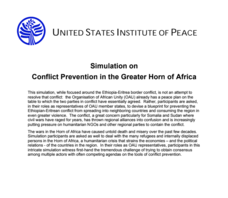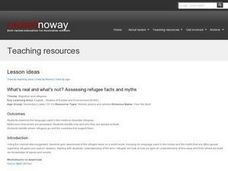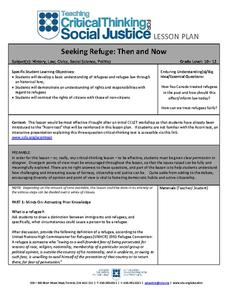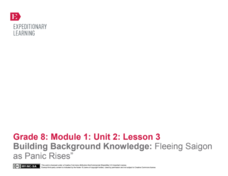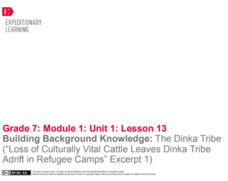Refugees Teacher Resources
Find Refugees lesson plans and worksheets
Showing 540 resources
Curated OER
Teaching the Holocaust Through Poetry
W.H. Auden’s poem “Refugee Blues” launches a study of the problems of refugees. Background information about the poem and general information about Jewish refugees from Germany and Austria are provided, as are discussion questions and...
Constitutional Rights Foundation
U.S. Immigration Policy and Hitler’s Holocaust
Though the Statue of Liberty welcomes political refugees to her shores, the welcoming sentiment has not always been reflected in the American citizenry. High schoolers read about the regrettable period in United States history...
Curated OER
Refugees from the Caribbean: Cuban and Haiti "Boat People"
Students investigate the plight of Cuban and Haitian refugees. In this refugee lesson, students discover the history of "boat people" and U.S. policies regarding refugees. Students role play presidential advisers that must recommend new...
Curated OER
Seeking Refuge, in Words And Pictures
Students explore first-hand accounts and pictures of refugees, focusing initially on child refugees in Chechnya. They then create collages that describe, through words and images, the experience of refugees in countries at war.
US Institute of Peace
Simulation on Conflict Prevention in the Greater Horn of Africa
Is containing a conflict possible in the Horn of Africa? Young peacekeepers engage in a simulation that examines the multi-faceted conflict that exists between the countries of Ethiopia and Eritrea. Representatives from ten countries in...
Curated OER
Migration and Refugees
Students explore issues relating to refugees. Using the internet, they gather facts about refugees. Students discuss the range of situations which turn citizens of one country into refugees of another.
Curated OER
What's Real And What's Not? Assessing Refugee Facts And Myths
Students examine language used in media to describe refugees, and identify how and why myths and misnomers are spread as facts.
Students then identify where refugees go and countries that support them.
Curated OER
Teen Refugees: Comparing Life Experiences
Students explore war refugees and their life experiences. After reading about refugees, students compare and contrast the experiences of teen war refugees with their own experiences. They write simulate writing letters as if they were a...
Curated OER
Coming to Terms: Stories of Southeast Asian Political Refugees
Eleventh graders examine the reasons why Southeast Asian refugees left their home for the United States. They conduct interviews and research their suffering and history. They examine primary source documents to better understand their...
Curated OER
Pack Your Bags: Learning about refugees
Students participate in a role playing activity where they become refugees from their home. They participate in a discussion about the reality of survival while in hiding or with only the few things that they could gather and take with...
Canadian Civil Liberties Education Trust
Seeking Refuge: Then and Now
Participants examine refugee law and policies and read several case studies to prepare for a discussion of this hot-button issue. The packet includes a wide range of materials representing a variety perspectives.
EngageNY
Building Background Knowledge: "Fleeing Saigon as Panic Rises”
How can scholars better understand the refugee experience? Pupils read Fox Butterfield's article "Panic Rises in Saigon, but the Exits are Few" and connect it to the novel Inside Out & Back Again. They annotate the text, looking for...
College Board
2015 AP® Human Geography Free-Response Questions
How are population and political power related? What is the significance of the globalization of English? Why do refugees leave their home countries? Using structured short-answer questions, scholars unravel complicated dynamics with...
PBS
Cuban Exodus
A video spotlights former child refugees and their experience of leaving their home country, Cuba, to live in Florida for a safer life. While Fidel Castro reigned, many Cubans families and small children made the decision to leave,...
EngageNY
Analyzing the Content of a Model Essay: “How Ha’s Mother Is Turned ‘Inside Out’”
What are the psychological and emotional effects associated with being a refugee? Scholars consider the question by reading and analyzing an essay, "How Ha's Mother is Turned 'Inside Out.'" Once finished, they engage in a whole-class...
EngageNY
End of Unit 2 Assessment, Part One: First Draft of Analysis Essay
How do writers use evidence from literary texts to support analysis and reflection? With instructional activity 17 of 20 from the Grade 8 ELA Module 1, Unit 2 series, learners gather resources to prepare for an end-of-unit assessment....
Curated OER
Central American Immigrants to the United States: Refugees from Unrest
Young scholars identify the major aspects of Olmec and Mayan civilzations, including economic, political, and religious. They list contributions of these civilizations. Students identify the Central American countries where the United...
Media Smarts
Media Awareness Network: Hate or Debate?
Discuss the difference between legitimate debate on a political issue and arguments that are based on hate through a science-fiction scenario that shows how a controversial issue can be discussed in both ways. Then learn how purveyors of...
Geography Now
Geography Now! Lebanon
Lebanon has 18 people groups, each with its own history. The geography of the country mirrors this diversity, as one can ski in the morning and be on the beach by the afternoon. A video resource profiles the nation's complex history and...
Curated OER
Credit to the Nation: Human Rights Cards
Young scholars examine the lives of refugees. In this human rights lesson, students use the provided refugee cards to play games that require them to learn details about the lives of the refugees.
Curated OER
Voyage of the St. Louis
Ninth graders explore the lives of Jewish refugees during WWII. After reading a brief passage about the people and the voyage of the St. Louis, 9th graders discuss how refugees have been treated historically. Reading and testing...
Echoes & Reflections
Survivors and Liberators
The end was just the beginning. The period immediately after the end of World War II and the Holocaust is often called "The Return to Life" as survivors looked to reunite and recreate broken families and shattered lives. A two-lesson...
Curated OER
Asylum Talk Show
High schoolers investigate the case of a German ship containing Jewish refugees seeking asylum from Nazi persecution in the late 1930s. They conduct Internet research, watch a video, and role-play passengers from the St. Louis on a...
EngageNY
Building Background Knowledge: The Dinka Tribe (“Loss of Culturally Vital Cattle Leaves Dinka Tribe Adrift in Refugee Camps” Excerpt 1)
Text annotations help readers track essential ideas. Pupils continue reading and annotating an informational article about Sudanese tribes, connecting it with A Long Walk to Water by Linda Sue Park. They also begin writing about their...
Other popular searches
- Afghanistan Refugees
- Rwandan Refugees
- Tsunami Refugees
- Afghan Refugees
- Responsibilities and Refugees
- Albanian Refugees
- Refugees Introduction
- Afghanistan's Child Refugees
- Refugees Plan a Camp
- Refugees Asylum Seekers
- Canadian Refugees
- Discrimination and Refugees






